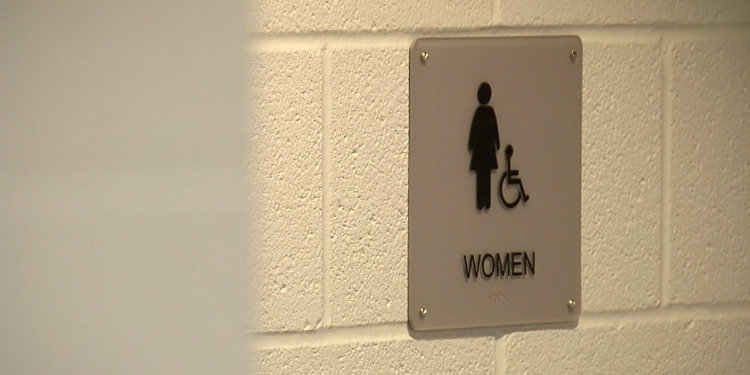Bradie Anderson is afraid that using the boys’ bathroom in her high school in Northeast Ohio could put her in physical danger.
According to her mother, Anne, the 14-year-old sophomore is transgender and has never faced any difficulties while using the girls’ restroom at school.
Anne asserted that her daughter would not be allowed to use the boys’ bathroom, as she feared for her safety in such a scenario. “I shudder to think about the consequences if my daughter were to enter the boys’ bathroom,” she stated firmly.
The Ohio House has recently approved a bill that would prevent transgender individuals, such as Bradie, from using the restroom and locker room that corresponds with their gender identity. The legislation is currently awaiting concurrence from the Senate, but the lawmakers are on break until after the election.
Anne expressed her concern about the bathroom bill and how it could potentially harm children. She questioned why anyone would want to endanger a child’s safety, regardless of whether they understand their gender identity or not. The bill, in her opinion, has the potential to cause harm and should be reconsidered.
Anne has raised a crucial question regarding the bathroom bill. She wonders who would be responsible for monitoring the bathrooms if the bill is passed.
Anne expressed concern about the potential questioning of individuals who do not conform to traditional gender norms. She highlighted the fact that even cisgender individuals could potentially be affected by this issue. The fear of not appearing feminine or masculine enough could lead to unnecessary scrutiny and questioning.
The American Medical Association firmly stands against any policies that restrict transgender individuals from obtaining basic human services and accessing public facilities that align with their gender identity.
Anti-transgender legislation in Ohio
Ohio lawmakers have introduced several anti-LGBTQ+ bills in the General Assembly, and the bathroom bill is just one of them. Other bills include banning gender affirming care and preventing transgender athletes from participating in women’s sports, as well as forcing educators to disclose students’ personal information to their parents.
Anne emphasized that the children in question are not mere talking points but real kids.
Eight years ago, Bradie came out as transgender and was subsequently expelled from Catholic school. She was compelled to switch to public school, where she began to face harassment from her middle school peers. This harassment coincided with the introduction of anti-transgender legislation by Ohio lawmakers.
Despite facing harassment, Bradie remains committed to advocating for herself and other members of the transgender community. At just 11 years old, she began speaking out at protests and has since testified in committee meetings against a number of anti-transgender bills. Her bravery and dedication to the cause is truly inspiring.
Ohio’s numerous anti-transgender laws are having a profound impact on Bradie, a person who depends on gender-affirming care.
Anne shared that the recent weeks have been a challenging time for her and Bradie. Bradie has been feeling very upset and has been crying due to the harassment they face in their town. Anne mentioned that the anti-trans bills, especially the bathroom bill, have caused major anxiety for Bradie.
Bradie is passionate about soccer, but the ongoing scrutiny surrounding transgender athletes has made her hesitant about playing this fall.
Anne emphasized that the identity of her friend extends beyond being transgender. She expressed her friend’s frustration towards the adult bullies in their town who unjustly target her, despite not having any children in the school.
Bradie has no plans of leaving Ohio despite the numerous anti-transgender bills being proposed in the state.
Anne firmly stated that it was unfair for her to have to leave town just because some people were ignorant. “I grew up here,” she said, “and I’m not going to let them push me out.”

